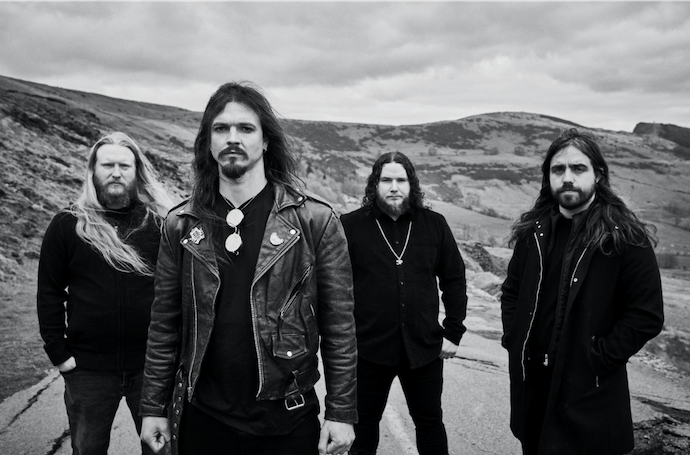
(Eleven months have passed since Andy Synn delivered an installment of his Saturday interview series on lyrics in metal, but as the following article reveals, the series has been hibernating rather than dead.)
Damn, it’s been quite a while since we’ve published one of these articles hasn’t it?
The reason for this is both simple and complex. While I really enjoy doing them, and quite a few of our readers seem to enjoy them too, the existence of Waxing Lyrical as an ongoing column is predicated both on me having time to put each entry together (and my time has been stretched pretty thin over the least year) and finding enough bands who are willing and eager to participate (oddly enough, not as easy as you might think).
Still, I’m hopeful that today’s edition is going to be the first in another long run of pieces highlighting the art (and effort) behind the lyrics behind the music we love, and I/we couldn’t ask for a better way to resurrect the column than by talking with bassist/co-vocalist Anchorite (aka Matt McGing) of NCS-approved Black Metallers Necronautical, whose fourth album, Slain in the Spirit, is scheduled for release on August 20 via Candlelight Records.
BEGINNINGS…
I took a sidestep into writing lyrics after writing a pathetically large amount of poetry during my study of English Literature at university.
Even considering the volume of lyrics I’ve written for Necronautical (and our songs are rather verbose), the majority of creative writing output I’ve had is still likely in the medium of poetry (most of which will hopefully never come to light).
Thus, as an “award-winning” performance poet, the mantle of lyricist naturally fell at my feet, and it makes the student loan repayments all the more bearable to know that it was not entirely pissed away, and that I can still take some pleasure in the craft.
There are, in our earlier works, a few sets of lyrics penned entirely by Naut and a choice one by Carcarrion, on Apotheosis, but on our upcoming album I have taken a more explicit lead role for writing the lyrics (although their influence and suggestion remain key to that writing process).
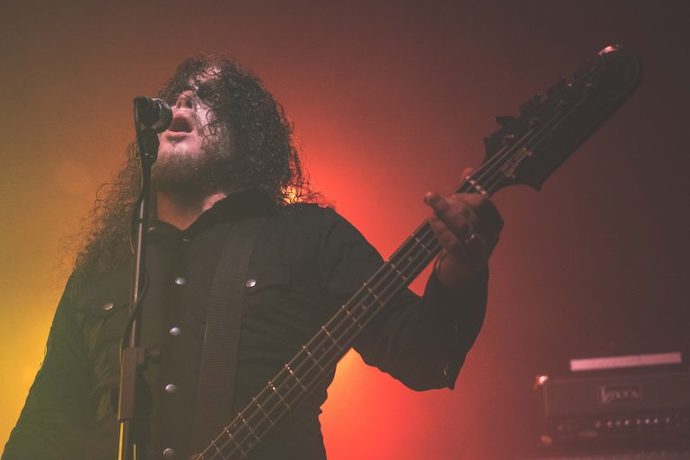
INSPIRATIONS…
Writing lyrics for Necronautical is quite an interpretive process for me as I do not write the music, so it is very much about trying to capture the essence of each song as it is presented. I like to think that I am discovering a particular facet of a song and preparing it for display, rather than prescribing some absolute meaning.
I like to position myself more as curator or editor than narrator as I compile these disparate musical elements into the single text of an album. As such, I often utilise language, literary devices and references that make this alienation between creator and meaning more pronounced.
In terms of my inspiration and actual mechanical writing process, they are the same: like any self-respecting creative type, I always start with a mood board. I collate images, phrases, clips of films, references to novels, poetry, scientific papers, films and soundscapes that are evoked or reflect my response to a piece. Often these are rooted in suggestions from other band members, particular lines or words, or the idea to reference a specific work or establish a particular mood.
I use these to determine a unifying register from which to begin the actual writing (hot tip for all you lit-crit types out there, the unifying register for our upcoming album was a fusion of the academic study of altered states of consciousness and 19th century occultism).
This then determines what format and structure the text of each song takes, although there is, of course, special consideration for metre, as harsh vocals are uniquely percussive, and the flow and rhythm of a line can affect the meaning just as much as the content.
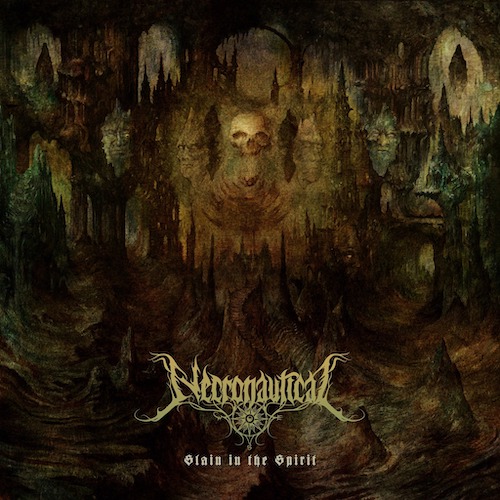
INFLUENCES…
I have a real penchant for puns which doesn’t often translate well into black metal, so I’m always happiest when I feel I’ve used wordplay for a sinister or eerie effect rather than comedic one.
My favourite example of this from the upcoming album is the second verse from the track “Slain in the Spirit” which is a term used in revivalist Christianity to describe being physically overcome by religious ecstasy, and I’ve used an array of religious terminology to subvert the metaphor to describe a whole host of thoroughly unchristian acts
In terms of other works, there’s too many to pick favourites, but I often tap into the grand tradition of the poetic response, and reference my favourite writers with turns of phrase or vocabulary choices to add emphasis to concepts that a particular author might be associated with, sometimes with subverted meaning.
Black Metal is canonically full of John Milton and J. R. R. Tolkien references, so I’ve tried to push the boat out with some Dylan Thomas, William Blake and Alexis Kennedy, amongst others.
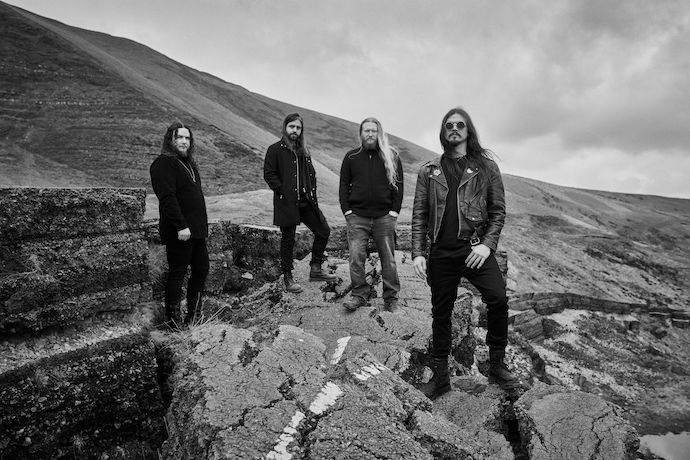
CHANGES…
The main change over the years is that I have better accepted editing, redrafting, workshopping and total rejection of my ideas.
There is a real tendency for burgeoning creatives to consider that whatever art they produce is perfect as-is, and that no-one could help realise your vision more perfectly than you. This may well be true, but something with intense personal meaning can still be objectively and technically piss-poor.
Coming to terms with the premise that art does not have to be spontaneously successful to have merit, and embracing the redraft was a significant step towards better writing for me.
I have previously shied away from being overtly ‘literary’ in my writing, perhaps to try and avoid accusations of being or sounding pretentious or non-genuine, but now I accept that someone is going to think I’m a dick either way, so I may as well try and get some metonymy and an unreliable narrator in there just for my own enjoyment in flexing the literary muscles.
Despite this change in attitude and approach, my process of actual writing has remained pretty similar to how it has always been… sat at my desk with about seventy browser tabs open.
What’s changed is that it’s now a longer process, that is revisited more often, while the biggest single change is that since writing and recording The Endurance at Night I’ve relied on mood boards as a way of planning and writing collaboratively for each album.
Being able to use images, clips and quotes as starting points for writing has really helped me stick to the points I’m trying to get across, as well as convey the actual writing objectives to the band.
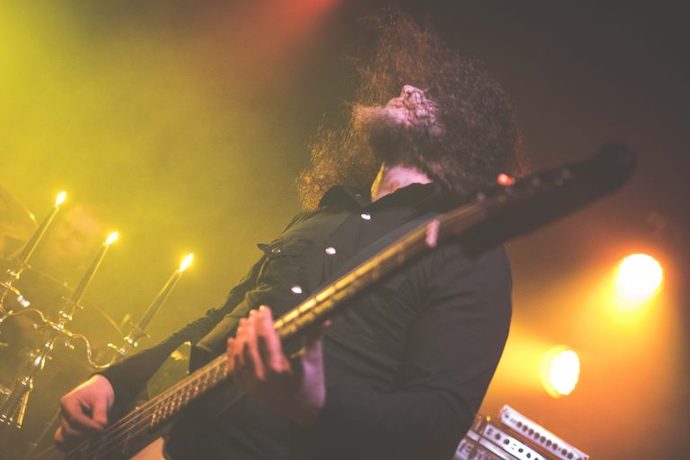
SOMETHING OLD…
One of the more emotive sets of lyrics I’ve written is “Theia”, the final track on The Endurance at Night (and the 3rd movement in the hidden “Lunar Triumvirate” suite). An ‘at first glance’ reading would suggest it’s a pretty normal, every-day first-person account of the moon reflecting on the tragedy of his own creation, only made possible by the death of his mother, the titular proto-planet, but, for me at the time, the song was an attempt to express my petty, earth-bound feelings by transforming them into an epic, cosmic tragedy.
At the time, I had recently had my second child but was still a young parent with very little confidence in what I was doing, I had just crashed out of my middle-class “dream-career” and I was struggling to reconcile my identity as a 9-5 family man with my identity as nonconformist Metal guy.
I was hugely dependent on the support of my parents in this difficult time, and all I could think about was what a difficult shit I had been to them throughout my life, mostly in pursuit of the latter identity.
This idea that, despite my own best efforts, I had still ended up like my parents (the ultimate existential dread of any self-respecting non-conformist!) and was coming to terms with that deterministic existence, was the foundation for this unusual, bittersweet song.
“Theia” was the last set of lyrics to be written for the album, and the lunar theme had already been established in “Pure Moon” and “Oceanus Procellarum”, so the allegorical use of the Giant Impact Hypothesis was a natural fit for the setting.
Unusually for me, there is little to no rhyme scheme, and I remember actively avoiding literary flair, and instead focusing on vocabulary choice to make the song seem quite stark in contrast to some of the other tracks on the album.
SOMETHING NEW…
“Hypnagogia”, the first track to be released from our new album Slain in the Spirit is another deeply personal song for me, both because I’m incredibly proud to finally be sharing and discussing new music, and because for most of my life I have suffered with insomnia.
“Hypnagogia” is the transitional state of consciousness between wakefulness and sleep, an eerie realm that many insomniacs find themselves trapped in, privy to lucid dreaming, sleep paralysis and hallucinations. Anyone who regularly struggles to sleep will know this unsettling state of mind very well.
Unlike in “Theia” I’ve attempted to use more interpretive imagery, trying to capture the essence of my personal experiences, rather than describing them exactly.
The studies of sleep and consciousness both have fantastic vocabularies, and I feel there’s something innately Gothic about rarely-used but technically correct words like “cataplectic” and “phantasmata”.
I’ve tried to write with specific sounds and registers in mind for the clean and harsh vocals also, to emphasise the different timbres of the vocal styles, which is not something I’ve always previously done, and there’s also more use of different metres within the same vocal sections, to highlight the “disjointed” feeling of the song.
Comparing the two tracks across the years I think “Hypnagogia” shows a confidence of writing style that I suppose only comes with time and practice. At least I’ve clearly felt confident enough to flex the literary muscles without feeling worried about my metal-guy credibility. At the same time I don’t really regret anything I’ve written, or wish I could change it, I am just glad that I feel like I can finally reconcile my dual identities as a metal head and a poetry nerd.
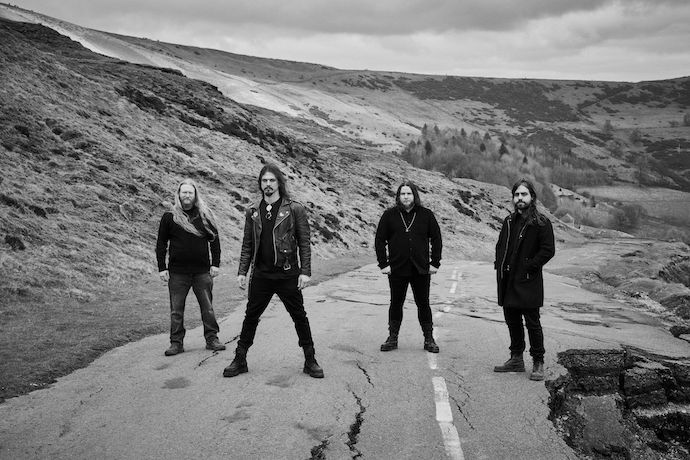
AND FINALLY…
Every ‘next album’ discussion starts with how you’re going to make it stand out from the last one, (unless you’re Iron Maiden) and the initial suggestion for every album since our early demo recordings has been that the next one needs to be the “hot” album, in contrast to all those cold necro sounds, so I would recommend digging out your copies of The Divine Comedy because the mood board is leaning in that inevitable direction.
It’s been a rare pleasure to take this opportunity to talk about the writing process. In metal, where so much of the genre convention is based in that anti-establishment, punky aesthetic, it feels unusually pleasant to focus so much on meticulous craft, rather than raw, guttural shrieks of pain or methodically hailing Satan. Both of which I also adore.
https://necronautical.lnk.to/SlainInTheSpirit
